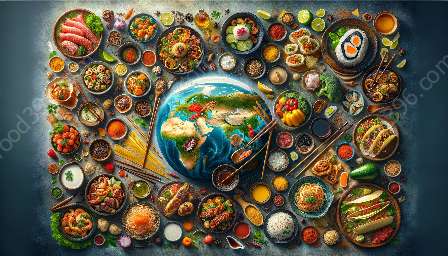Food and globalization are intertwined in a complex web of cultural exchange, economic influences, and technological advancements. The interconnectedness of the modern world has led to the spread of diverse cuisines, creating a rich tapestry of global food and drink cultures.
The Globalization of Food
Globalization has significantly transformed the way people produce, distribute, and consume food. Advances in transportation, communication, trade, and technology have facilitated the international exchange of culinary traditions and ingredients. As a result, food has become a powerful vehicle for cultural exchange and understanding, shaping the way people perceive and experience different cultures around the world.
Cultural Fusion and Culinary Diversity
Globalization has led to a fusion of culinary traditions, giving rise to new and exciting flavor combinations and culinary creations. As cuisines from different parts of the world interact and influence each other, a diverse and dynamic food landscape emerges. This culinary diversity offers a glimpse into the richness of global cultures, reflecting the unique histories, traditions, and values of different societies.
Comparative Study of World Cuisines
A comparative study of world cuisines provides a fascinating insight into the similarities and differences among diverse culinary traditions. By examining the historical, geographical, and socio-economic factors that have shaped different food cultures, we can appreciate the interconnectedness of global cuisines and the ways in which they have evolved over time. This comparative approach allows us to explore the unique flavors, techniques, and ingredients that define traditional and contemporary food and drink cultures across the world.
Impact of Globalization on Food and Drink
The impact of globalization on food and drink extends beyond culinary experiences to encompass economic, social, and environmental considerations. The global food market is not only shaped by consumer demand and international trade but also by issues such as food security, sustainability, and food sovereignty. Understanding the implications of globalization on food and drink is essential for addressing the challenges and opportunities associated with the interconnected nature of the modern food system.
Sustainable Food Globalization
While globalization has brought about significant changes in food production and consumption, there is a growing movement towards sustainable and ethical food globalization. This includes initiatives to support local food systems, promote fair trade practices, and encourage environmentally responsible food production. By embracing sustainable food globalization, we can strive for a more equitable and environmentally conscious global food system that respects cultural diversity and traditions.
Exploring the Intersections of Food and Globalization
As we delve into the intersections of food and globalization, we uncover a wealth of interdisciplinary connections that span culture, history, economics, politics, and sustainability. The vibrant tapestry of global cuisines invites us to embrace diversity, engage in cross-cultural dialogue, and cultivate a deeper appreciation for the ways in which food reflects and shapes human experiences. By recognizing the impact of globalization on food and drink, we can navigate the complexities of the global food landscape with a greater understanding of its significance in our interconnected world.

